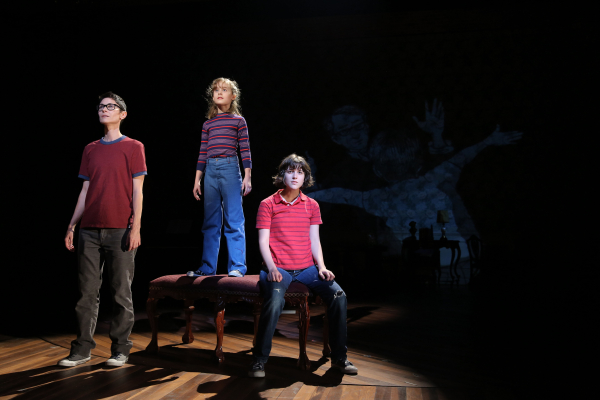Fun Home

(© Joan Marcus)
“I leapt out of the closet,” says cartoonist Alison Bechdel in the middle of Lisa Kron and Jeanine Tesori’s brave new musical Fun Home at The Public Theater, “and four months later my father killed himself by stepping in front of a truck.” Searing words from a middle-aged woman who is looking back on her youth and coming to terms with the suicide of a man who couldn’t make the same leap.
This journey of acceptance is at the heart of Fun Home, inspired by the real-life Bechdel’s autobiographical graphic novel of the same title. That morbidly funny work seems like odd source material for the stage; in fact, Bechdel says in a recent interview that she agreed to the adapting of her work because she “had no idea anyone could turn this comic book into a musical.” And yet, after seeing what book writer/lyricist Kron and composer Tesori have created, the question of “how” completely evaporates. In collaboration with director Sam Gold, this team has created a stunning piece that breaks the mold of musical theater both in content and staging. Not only does Fun Home use the musical form to its fullest extent to create what is essentially a graphic novel on stage, but it also gives voice to a group surprisingly underrepresented in musical theater, gay women.
Alison’s alternately strained and close relationship to Bruce (Michael Cerveris), her closeted father, makes up the heart of Fun Home, titled for the Bechdel family’s piquant nickname for the funeral parlor they run. Bruce was prone to fits of rage and fits of loving kindness. Regarding Alison’s childhood desire to draw cartoons, Bruce responds, “You want to take a half-baked mess to school, you want to embarrass yourself like that, it’s fine with me,” though despite these feelings in her college years he would send her books so they could commiserate over literature.
In keeping with the tradition of Tesori tuners Violet and Shrek, the role of Alison is played by multiple women of various ages. Sydney Lucas is “Small Alison,” the little girl who didn’t want to wear her barrette and notices strange feelings for “an old-school-butch” delivery woman. Alexandra Socha plays “Medium Alison,” the gawky college student whose first love (Roberta Colindrez) prompts her journey of self-acceptance. Beth Malone tenderly completes the trio as the fully-grown Alison, the narrator who is simultaneously observing her life and turning it into a story.
To do that, Kron, Tesori, and Gold deftly take advantage of the time- and reality-bending that musical theater inherently allows. Using a turntable, scenic designer David Zinn spins us from Alison’s home office to her college dorm to the stately, Victorian-interior of the fun home, flashing backwards and forwards through eras to offer comic strip-like snapshots through her life. (Adult Alison offers narrative commentary in the form of captions.) Interludes into fantasy production numbers, one hilariously involving a fake TV commercial for the fun home created by Small Alison and her adorable brothers, take further advantage of this magical form and become a contemporary version of dream ballets. (The brothers are adorably played by Griffin Birney and Noah Hinsdale).
The writers have also crafted a strong, intelligent, and witty score, excellently played by an eight-member orchestra led by Chris Fenwick and sung by the cast of nine, which also includes Judy Kuhn as Bechdel matriarch, Helen, whose eleven-o’clock number called “Days and Days and Days,” is a gorgeous sucker-punch of a song that encourages her daughter to live her life in a way that makes her happy. (This gift of a song leaves you wanting to hear more, not only of Kuhn’s voice, but of her character’s, as well.)
In fact, most of Kron and Tesori’s songs are gifts to performers. The young and preternaturally talented Lucas brings a shocking intelligence (for her age) to the number about the butch delivery woman, while the pitch-perfect Socha expertly delivers a delicious and buoyant love song about her new girlfriend, Joan — a direct descendant of Rodgers and Hammerstein’s “Wonderful Guy.” Cerveris, meanwhile, provides his best — and most layered — performance in years. His final scene involves a darkened car ride with Malone’s impressively understated and conflicted adult Alison. These moments and the ensuing song are nothing short of shattering.
That Fun Home‘s protagonist is a lesbian who isn’t a caricatured gym teacher or prison matron is as noteworthy as its structure, given that most gay-themed musicals focus on the struggles of male sexuality. In addition to a physical production that challenges viewers to look at the musical form through a different lens, Fun Home sky rockets onto the list of the decade’s most important new American musicals.










